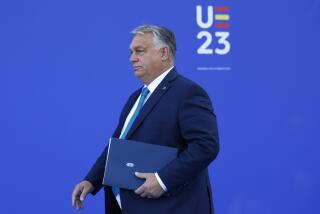Western Europe Wonders How Real Are the Changes : Eastern Bloc: Despite Communist Party name changes, most of the leadership is the same. Whether policies change is the valid question.
- Share via
ROME — Are communist reforms in East Europe merely cosmetic or do they represent real change? This is the dilemma of Western Europeans, as they watch the great events unfolding in the East Bloc.
After visiting East Berlin, Prague and Budapest--just before the Hungarian Communist Party decided to change its name--I have come to a two-track conclusion. Communist reforms are in large part cosmetic. At the same time, some window dressing may be necessary in order to encourage Western solidarity without unduly worrying Moscow.
Sympathetic observers say the Kremlin is essentially interested in the Soviet Union’s military security and therefore will not interfere with political reforms in the East Bloc countries. The line indicating the limits of Soviet tolerance is still undefined, drawn in sand. Yet realists sensibly suggest that Moscow can accept a large measure of political change in Eastern Europe only if the reformed Communist Parties retain some amount of political control and thus offer a guaranty of continuity to the Kremlin.
Changing the party name--as the Hungarians have done--has enormous psychological impact. Yet it may mean little change in foreign and security postures if the new leaders are essentially the same people who, for decades, have enjoyed the privileges of power.
In fact, up to now they are the same, like Gertrude Stein’s rose by any other name. Whether their policies remain the same is the valid question.
Rezso Nyers, the president of the renamed Socialist Party, and Imre Pozsgay who is generally expected to win the coming presidential elections, have respectable communist pedigrees. Under new leadership, about 8,000 party officials are scrambling to keep their jobs. They have been reassured: Reform does not mean punishment; they will be asked to put their precious administrative experience at the service of the nation.
In East Germany, the majority of intellectuals asking for reforms are repentant communists. They are too intelligent not to understand that no one in East Berlin still reads and respects the boring local newspapers--strictly controlled by the Communist Party--when they can tune to West Berlin’s TV news. But most of these intellectuals are not opponents recently released from prison or concentration camps. They are willing to talk when they are out of the official buildings--where they continue, apparently, to be faithful servants of the regime.
In four decades of tyranny, two entire generations have been educated and trained within rigid communist doctrine. Even if they are repentant, the former communists who now lead the reforms in Eastern Europe are not immune to the lingering disease and they are unable to reject totally the old indoctrinated principles of Marxism.. This reassures the Soviet government, well aware that military security requires a measure of political loyalty from those who will command power in coming months.
Yet cosmetics in the reform process for Eastern Europe do not exclude some real change. The more prudent the introduction of reforms, the more reassuring they will be for the Soviet leadership.
Is that contrary to Western interests? I do not believe so.
If change comes abruptly, the result could be chaos across the whole Continent. Old antagonisms, anxieties and disputes are flourishing among the East Bloc nations. Many of these nations have recently adjusted boundaries, borders unquestioned since the end of World War II because of the powerful constraints exercised by Soviet rulers. What will happen if suddenly the genie of old grudges explodes out of the bottle?
In Budapest--during a recent conference on reforms organized by Hungarian communists--the Polish representative of Solidarity kept silent for most of the meeting. Then, when I raised the question of the reunification of Germany, he asked for the floor and spoke for 30 minutes. For him and for his two colleagues, representatives of the Polish Communist Party, the mere prospect of such an event was anathema. A reunified Germany would quickly raise the question of the vast German territories annexed by Poland after the last war.
At the same conference was a senior member of the Democratic Forum, one of the most promising liberal movements of the Hungarian opposition. Complaining about the sufferings imposed by the Bucharest government upon the Hungarian minority, he evoked the nightmare of Romanian military aggression. His surprising recipe for avoiding it: Keep a couple of Soviet armored divisions in Hungary, as a deterrent.
If violence erupts in Eastern Europe, darkness will envelop the entire Continent. Western European nations have learned the lessons of the past and have eliminated the very notion of war as a means of resolving disputes. But after 40 years of forced and unnatural amity imposed by the Soviet Union, the nations of Eastern Europe may not exercise the same sort of voluntary restraint. Thus, a cautious pace for reforms--to sustain evolution without generating revolution, one that could be accepted by the Soviets and supported by the West--is the best recipe to ensure security for all.
More to Read
Sign up for Essential California
The most important California stories and recommendations in your inbox every morning.
You may occasionally receive promotional content from the Los Angeles Times.













